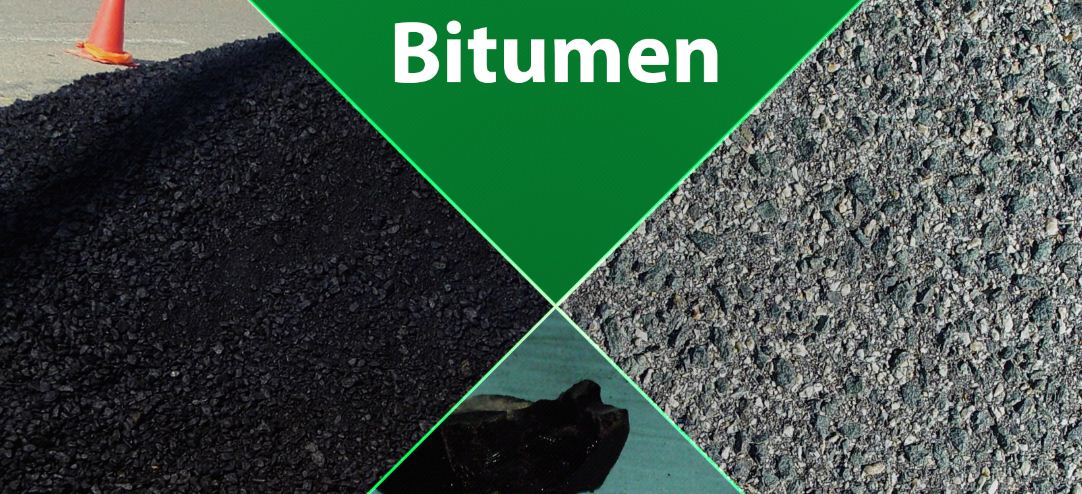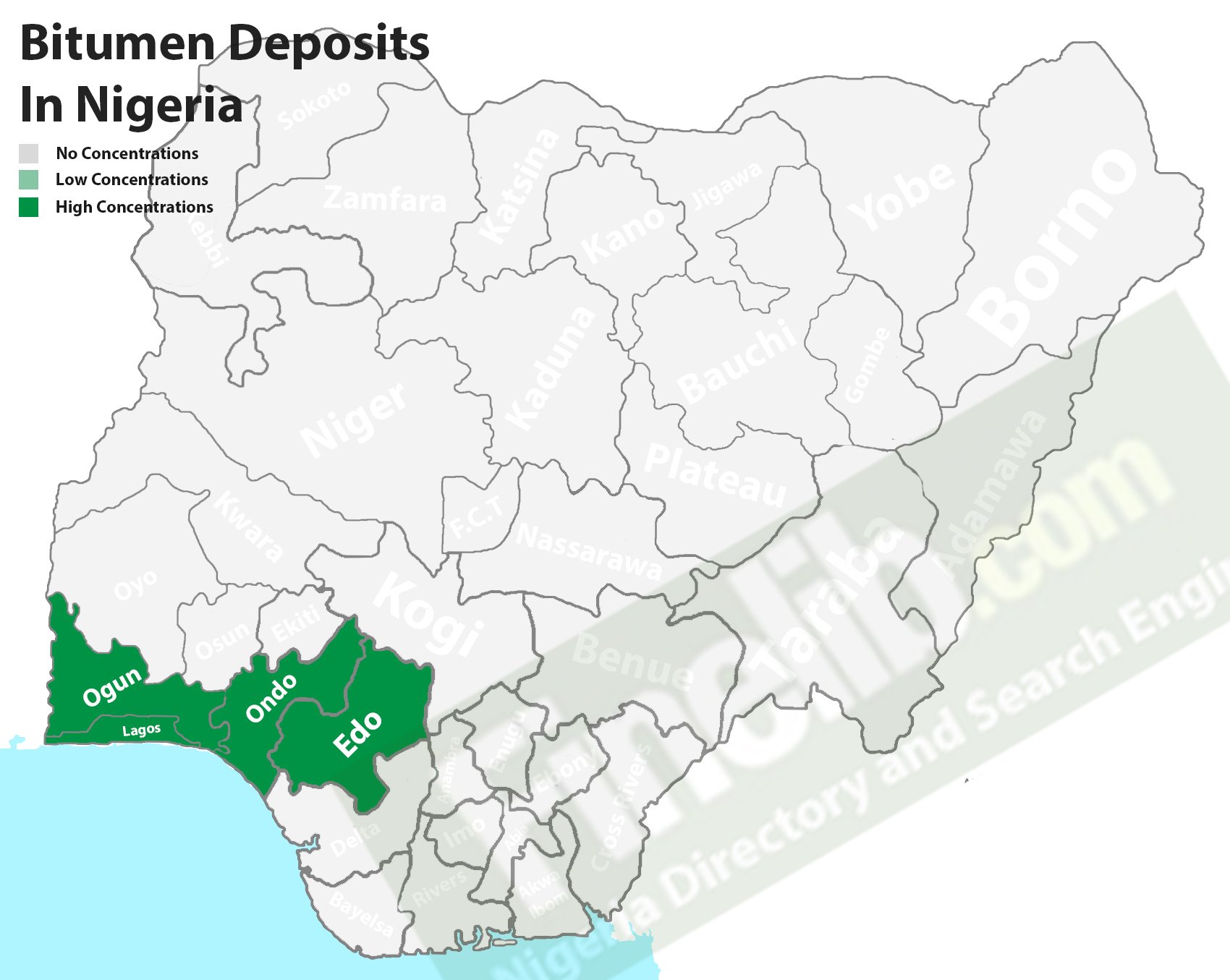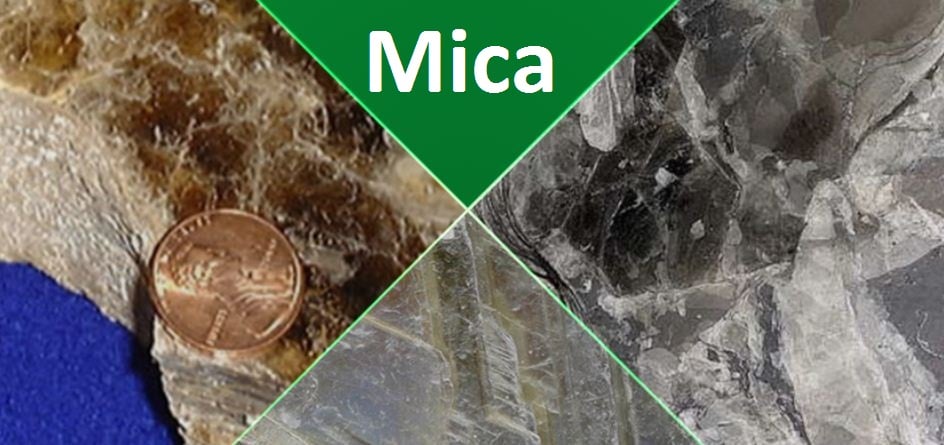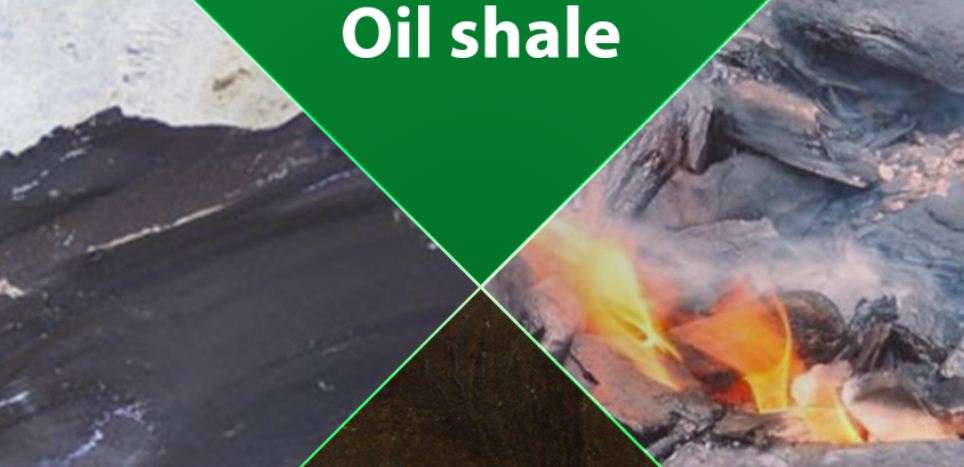Bitumen Deposit States In Nigeria

Bitumen is one of the richly deposited mineral resources in Nigeria and in some Africa countries, just like crude oil, it is found in Ondo, Lagos, Ogun, and Edo State.

Development and Exploration of Bitumen in Nigeria
Bitumen is the viscous mixture of hydrocarbons that may occur as natural deposits or as a residue from petroleum distillation. It was discovered first in Nigeria around the 1900s, with its exploration beginning particularly in 1905.
In Ondo State, where a larger deposit of tar sand/bitumen is, the state government is advocating on behalf of its people for the exploration of this mineral in the state.
From the government's view, its development can help reduce the environmental degradation which is caused by the spilling of the bitumen on the farmlands and rivers, and as well will create not only employment for the people of the state and the nation at large but will also lure prominent local and international investors.
In as much as the mineral resources can richly serve as an alternative to crude oil which has declined over the years, it is good to know also about the implications involved in the mining as it can lead to deforestation and likely affect most parts of Irele Local Government Area of Ondo State, where the bitumen deposits occur in huge quantity.
This location is recorded as the largest deposit of bitumen in Africa and the second-largest deposit in the world.
Recently, a technical and economic evaluation of Bitumen in the southwestern region of Nigeria was conducted, and it was observed that it contains oil which accounts for more than 13 to 16 billion barrels of oil.
Occurrence of Bitumen in Nigeria and its Reserve
In Nigeria, bitumen occurs naturally at few locations, and the deposits are found typically on the surface and sub-surface.
This implies that they occur on the uppermost layer of the earth, as well as in the strata below the earth's surface. For this reason, miners apply both surface and subsurface mining to extract bitumen from its ores in Nigeria.
Bitumen is found in massive quantities mainly in the southwestern part of Nigeria, specifically in tar sand of Ilubirin, Loda, and Agbabu in Ondo. Other places are Lagos, Ogun, and the central-southern region, Edo state.
Nigeria has bitumen deposits extending around 120km approximately, thus ranking the second largest in the world's bitumen deposits.
In Ondo state, the estimate of the amount of bitumen available for extraction (i.e. the probable reserve) is 16 billion barrels.
Bitumen deposits which are found naturally in Ondo State have two basic concentrated forms, which are: seepages and outcrops of bitumen - tar sands that yield bitumen and require further extraction processes.
Then the second form is the lower viscous bitumen; these are the seepages mainly gotten from wells without obvious connection with sand.
Generally, the total estimated reserve of bitumen in Nigeria is about 42.74 billion metric tonnes, which majorly remains to be exploited for years.
The entire probable reserve of bitumen is scattered along these major states of Nigeria which include; Ondo, Ogun, Delta, Bayelsa, and Rivers.
In the global estimation of oil and bitumen reserve, Nigeria is ranked no.6 with approximately 38 billion barrels in place.
Bitumen Extraction in Nigeria and Machineries Used
Nigeria's Ministry of Mines and Steel Development identified surface mining as the major bitumen mining method that should be employed throughout the country.
Small scale surface mining is used to remove overburden at any location in Nigeria, especially where bitumen is discovered between 0 – 20 meters near the earth's surface, the mineral is exploited economically.
Types of machinery that are needed to accomplish mining and extractions of bitumen are:
Automatic bitumen extractor - Used for separating bitumen from the mineral matter in an asphalt mixture.
Mining trucks – This is the machinery uses for high-production mining of bitumen.
Bitumen sprayer trucks or asphalt distributors - Used for controlled spraying of bitumen on the surface before laying hot asphalt mixture.
Prices of Bitumen in Nigeria market
Currently, the price of bitumen, particularly the emulsion type in the Nigerian market is N175 per litre.
While 100% pure petroleum bitumen with 180 /150kg of weight, packaged in standard new steel drums costs N210, 489.
What Bitumen is All About
It is a blackish viscous liquid which is a by-product gotten from the fractional distillation of crude oil and has a boiling point range of about 500°C – 700°C.
Bitumen can also be found naturally in tar sand where it can also be processed and refined into oil-rich bitumen. Again, it can be found as a refined product where it occurs via crude oil fractional distillation.
Another name for bitumen is asphalt but is commonly known as that in the United States.
It relatively contains mixtures of non-volatile hydrocarbons which are flammable in nature, hence, exhibiting adhesive and waterproofing properties.
Classifications of Bitumen
Bitumen has 3 categories of classifications with respect to their generation source, which are petroleum asphalt, natural bitumen, and coal-tar pitches.
Natural Bitumen
These are natural hydrocarbons, also referred to as native asphalts occurring naturally through several climatic conditions.
Coal-tar pitches
They are tick black liquid substances that are formed basically by coal tar distillation.
Petroleum Asphalts
Are either solid or semi-solid bitumen which is obtained directly by the fractional distillation of petroleum or through additional processes. They have more applications than the other types.
Types Regarding Their Applications
On the other hand, bitumen is made of two main types regarding their applications: paving grade and roofing grade.
Paving grade, also called road construction bitumen, building bitumen, or thin bitumen, is widely used for road construction and for the production of superior asphalt pavements.
It's essential and vital because it binds together aggregates making them form a unique cohesion and stability to the bituminous mix.
Roofing grade (roof insulator or hard bitumen) is widely used for the construction and remodeling of homes, especially in the aspect of insulation application.
Other Types of Bitumen
Penetration grade bitumen
Blown bitumen
Oxidized bitumen grades
Mixed or solution Bitumen
Viscosity graded bitumen
Cut back bitumen
Performance graded bitumen (PG)
Bitumen emulsion
Polymer modified bitumen (PMD)
Where and How Bitumen (Asphalt) Originated
The history of bitumen, also known as asphalt dates started many decades ago. The Egyptians used it in the time of Pharaohs for several purposes.
Although its usage as a civil construction material began in Babylon around 625 BC, the ancient Mesopotamians have used it as waterproofs for water tanks and temple baths.
Asphalts were used by the ancient Greeks, and also in the Roman aqueducts, reservoirs, and baths.
The first time of using large blocks of natural asphalt (bitumen) for road construction was in 1824 for constructing Champs-Élysées in Paris, France.
Then in 1870, Professor Edward J. de Smedt, at Columbia University, New York, discovered modern road asphalt after his emigration from Belgium.
Smedt gave it the name "sheet asphalt pavement" but it was popularly referred to as "French asphalt pavement".
During the month of July that same year (1870), the first sheet of asphalt invented by Smedt was used for road construction at William Street, in the city of Newark, New Jersey.
Its application on road continued to widespread. In 1872, it was laid on Fifth Avenue, New York as well as another residential community called Battery Park city.
Moreover, about fifty-four thousand square yards of sheet asphalt obtained from Trinidad Lake were used after five years on Pennsylvania Avenue, Washington DC, USA.
Bitumen Price Today
The unit price for bitumen commodity is $265 per ton around 2016, which is the FOB, "Free On Board", the respective cost involved in the delivery for 185 kg drum and 150 kg drum of bitumen.
Recently, the price of bitumen commodity ranges between $200.00-$300.00 US dollars per metric ton.
Buyers and Countries Buying Bitumen
The countries listed below are majorly known for the importation of natural bitumen and asphalt.
Iran
France
China
Bahrain
Oman
Canada
Indonesia
Belgium
Singapore
The Netherlands
The Philippines
The United States
United Arab Emirates
These countries buy from top exporters regarding the choice of bitumen products.
Petroleum bitumen commodities are mostly exported to several countries across the globe by the following countries:
South Korea - $1.36B
Singapore - $840M
Canada - $707M
Spain - $674M
Germany - $557M
Several other countries and individual companies export bitumen of different types in varying quantities, but the ones mentioned above are known to be the leading exporters.
Uses of Bitumen
Bitumen emulsion type contains coat improvers, bitumen, water, anti strips, break control, and an emulsifying agent as basic ingredients, making it nice for producing emulsion paints, other households, and industrial products.
Is primarily used in civil construction works, such as road construction to bind aggregate particles to create asphalt concrete.
Bitumen has waterproofing properties, which makes it good for making bituminous waterproofing products.
It is used in the production of sealing flat roofs, roofing felt, and in making other roofing products such as soundproofing materials.
Conclusion
Nigeria is currently working toward the full development of bitumen exploration so as to meet not just the requirement within the country, but to make it a foreign exchange channel for the country.
Although Nigeria imports up to 450,000 tonnes of bitumen yearly to supplement the local consumption, vast quantities can be obtained from Nigeria tar sands in varying quantities for local usage in the construction industry.




